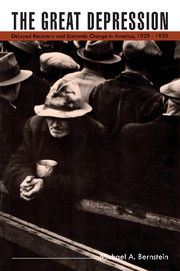Book contents
- Frontmatter
- Contents
- List of tables
- List of figures
- Editors' preface
- Preface
- Introduction: The puzzle of the 1930s
- 1 Long-term economic growth and the problem of recovery in the United States, 1929–39
- 2 The transformation of American industry in the interwar period
- 3 A reassessment of investment failure in the interwar economy
- 4 Technical change during the interwar years
- 5 The effective demand problem of the interwar period. I: Cyclical and structural unemployment
- 6 The effective demand problem of the interwar period. II: Cyclical and secular changes in final demand
- 7 New Deal economic policy and the problem of recovery
- 8 Contemporary economic problems in historical perspective
- Bibliography
- Index
8 - Contemporary economic problems in historical perspective
Published online by Cambridge University Press: 06 July 2010
- Frontmatter
- Contents
- List of tables
- List of figures
- Editors' preface
- Preface
- Introduction: The puzzle of the 1930s
- 1 Long-term economic growth and the problem of recovery in the United States, 1929–39
- 2 The transformation of American industry in the interwar period
- 3 A reassessment of investment failure in the interwar economy
- 4 Technical change during the interwar years
- 5 The effective demand problem of the interwar period. I: Cyclical and structural unemployment
- 6 The effective demand problem of the interwar period. II: Cyclical and secular changes in final demand
- 7 New Deal economic policy and the problem of recovery
- 8 Contemporary economic problems in historical perspective
- Bibliography
- Index
Summary
The historical sense involves a perception, not only of the pastness of the past, but of its presence.
– T. S. EliotThe problem of delayed recovery and the peculiar difficulties created by the incipient reordering of America's industrial structure in the 1930s were quickly overcome by World War II. The war provided a twofold stimulus. The more mature industries of the interwar period were brought out of their doldrums by the particular demands of making war. The new industries were pulled along by government orders, both through their contribution to a general increase in economic activity and through their particular demands on sectors such as petroleum, chemicals, electronics, and aviation. Mature and declining sectors were brought back to life, and new industries were at last provided with the generally high level of sales that the full emergence of new products and processes required. Indeed, the war itself spawned the development of other new industries, products, and processes. Thus, the 1940s helped to lay the foundation of prosperity in the 1950s and 1960s.
By the 1970s, however, the postwar prosperity of the American economy was in jeopardy. Much like the crisis of the interwar period, the persistent instability of the seventies raised fears about the longterm viability of capitalism and made a mockery of the optimism of the “New Frontier” and the “Great Society.” Indeed, in the 1970s, the performance of the American economy was somewhat similar to that in the 1930s.
- Type
- Chapter
- Information
- The Great DepressionDelayed Recovery and Economic Change in America, 1929–1939, pp. 207 - 224Publisher: Cambridge University PressPrint publication year: 1987



